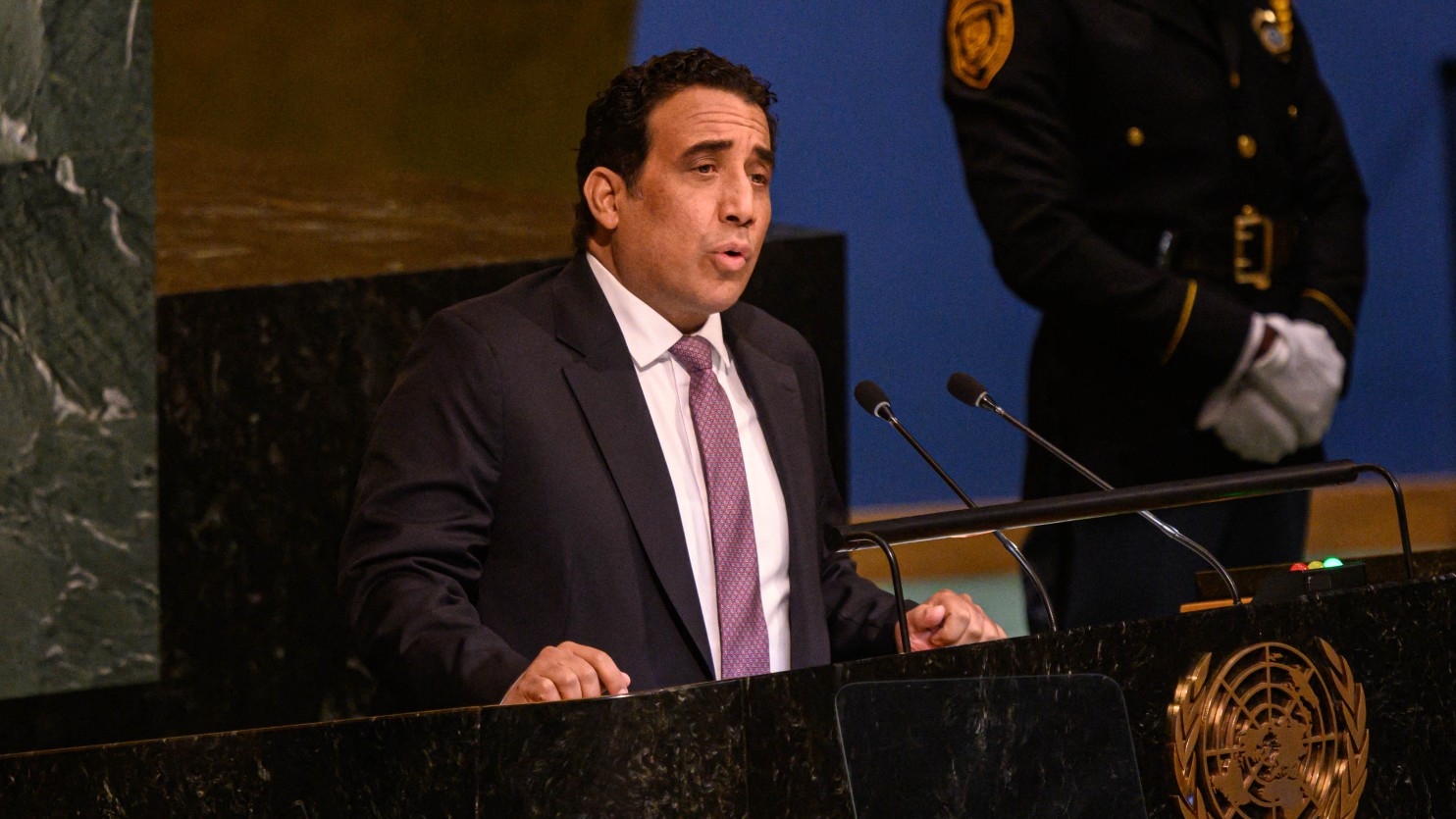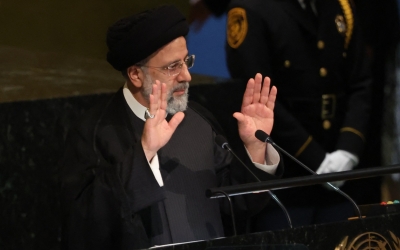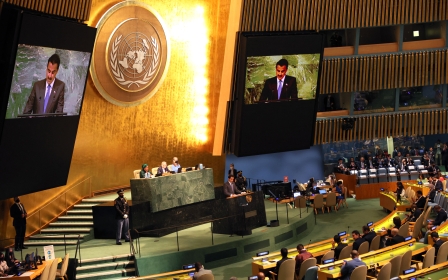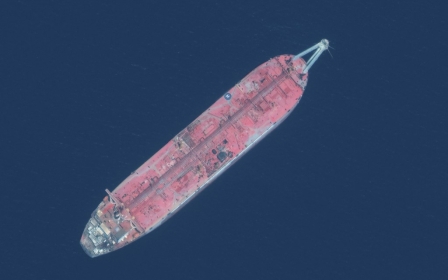UN: Libya appeals for help, Lebanon commits to solving economic crisis

On the second day of the 77th United Nations General Assembly debate, the war in Ukraine and the climate crisis continued to dominate world leaders' agendas.
Still, the leaders of countries in the Middle East spoke out about the crises taking place in their own countries.
Libya called on the United Nations to continue its commitment to help solve its political dilemma, Iran stressed a need to return to the nuclear deal and lift sanctions, and Lebanon stated its commitment to ensuring it finds a solution to the country's economic collapse.
Iranian President Ebrahim Raisi worked to portray his country as a victim of oppression and spoke out against unilateralism, pointing the finger at the United States.
"Whereas unilateralism has been the tool that has been used to hold many countries back on a selective basis, America cannot accept that certain countries have the right to stand on their own two feet," Raisi said.
In addition to outlining the remaining issues his country has with the stalled nuclear negotiations, Raisi also took his time at the podium to bring up the US killing of Iranian General Qassem Soleimani in January 2020.
Soleimani, the top commander of the Islamic Revolutionary Guards Corps' Quds Force, was responsible for Iran's clandestine overseas operations and was often seen on battlefields guiding Iraqi Shia groups in the war against Islamic State (IS) group.
A 2020 US strike destroyed a convoy carrying Soleimani and Abu Mahdi al-Muhandis, deputy leader of Iraq's Hashd al-Shaabi, a coalition of pro-Iranian armed groups.
Raisi said that Iran would pursue a tribunal to bring those who were responsible for his death to justice.
"The proper pursuit of justice in the face of a crime that the American president admitted to having put his signature on, will not be abandoned. We will pursue through a fair tribunal to bring to justice those who martyred our beloved General Qassem Soleimani," he said.
Libya looks to the UN for help
The head of Libya's presidential council, Mohamed Menfi, spoke for Libya at the UN on Wednesday, where he urged the UN to aid in bridging the country's political divisions.
"We still expect an active role of the United Nations through the new leadership of our UN Mission in our country," Menfi said.
"We call on the continuation of the mission in favour of national inclusive reconciliation that will allow us to overcome the current impasse. This impasse has opened the way for individual initiatives that risk undermining or the political progress achieved thanks to the political dialogue."
Late last month, fighting erupted in the Libyan capital of Tripoli, when rival factions exchanged intense gunfire and several loud explosions rang out across the city. More than 30 people were killed as a result of the clashes.
The oil-rich country has been wracked by conflict and political strife since a Nato-backed uprising toppled and killed longtime leader Muammar Gaddafi in 2011.
The current standoff pits the Government of National Unity, led by Prime Minister Abdul Hamid Dbeibah, against the administration of Fathi Bashagha, based in the country's east.
Tensions have been brewing since December after Libya failed to hold elections, with Dbeibah - who was selected in an interim capacity to lead a UN-backed political transition - insisting he would only hand over power to an elected government.
In response, Bashagha has spent months trying to install his government in Tripoli.
Bashagha, backed by eastern-based military strongman Khalifa Haftar, attempted to enter Tripoli in May, leading to a shootout and his departure from the city. Since then, however, a series of deals have brought realignments of some armed factions within the main coalitions facing off around Tripoli.
Lebanon's economic crisis
Lebanon's Prime Minister Najib Mikati spoke on Wednesday about the country's continued economic collapse, saying that his government has been working in a number of ways to mitigate the situation, including signing a preliminary agreement with the International Monetary Fund (IMF).
"The road ahead of Lebanon is still arduous, long and full of difficulties. Before we get out of this crisis, we are working with all our minds and determination to overcome it successfully," Mikati said.
Lebanon is in the third year of a financial meltdown that has left an estimated 80 percent of the population living below the poverty line. Since the onset of the crisis in 2019, commercial banks in Lebanon have frozen depositors out of their savings and restricted access to their accounts as part of informal capital controls.
The World Bank has said may the situation may be one of the three worst economic crises of modern times.
'The road ahead of Lebanon is still arduous, long and full of difficulties'
- Najib Mikati, Lebanese prime minister
An August report from the World Bank described the economic situation as Lebanese authorities operating a giant Ponzi scheme that has "caused unprecedented social and economic pain" over the past three decades.
The report is the second time this year that the World Bank has lambasted Lebanon's ruling elite. In January, the body accused them of "orchestrating" the country's catastrophic economic meltdown through their exploitative grip on resources.
Worth more than $2bn, Mikati was himself implicated in the 2021 data leak known as the Pandora Papers. It was shown that he is the owner of a company created in Panama then used to buy property worth more than $10m in Monaco. Mikati's M1 Group is linked to two companies based in the British Virgin Islands, which were used to buy offices in central London.
Mikati, who previously responded to the Pandora Papers revelation and said his family wealth was obtained through legal means, said on Wednesday that his government is working on "developing laws that ensure absolute transparency and combat the scourge of corruption".
Middle East Eye propose une couverture et une analyse indépendantes et incomparables du Moyen-Orient, de l’Afrique du Nord et d’autres régions du monde. Pour en savoir plus sur la reprise de ce contenu et les frais qui s’appliquent, veuillez remplir ce formulaire [en anglais]. Pour en savoir plus sur MEE, cliquez ici [en anglais].





